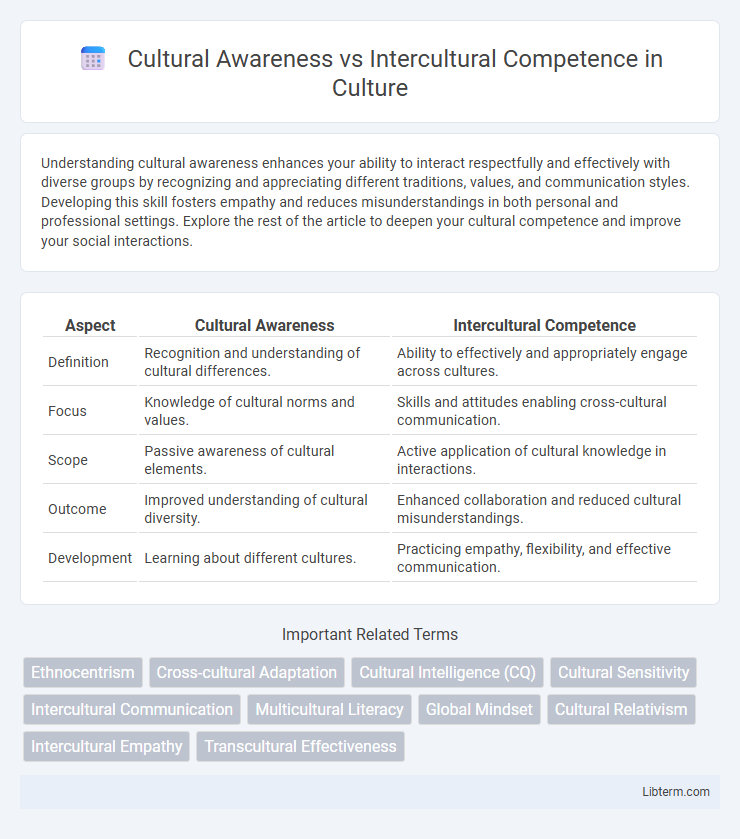Understanding cultural awareness enhances your ability to interact respectfully and effectively with diverse groups by recognizing and appreciating different traditions, values, and communication styles. Developing this skill fosters empathy and reduces misunderstandings in both personal and professional settings. Explore the rest of the article to deepen your cultural competence and improve your social interactions.
Table of Comparison
| Aspect | Cultural Awareness | Intercultural Competence |
|---|---|---|
| Definition | Recognition and understanding of cultural differences. | Ability to effectively and appropriately engage across cultures. |
| Focus | Knowledge of cultural norms and values. | Skills and attitudes enabling cross-cultural communication. |
| Scope | Passive awareness of cultural elements. | Active application of cultural knowledge in interactions. |
| Outcome | Improved understanding of cultural diversity. | Enhanced collaboration and reduced cultural misunderstandings. |
| Development | Learning about different cultures. | Practicing empathy, flexibility, and effective communication. |
Defining Cultural Awareness
Cultural awareness involves recognizing and understanding the differences and similarities between cultures, including customs, values, and communication styles. It emphasizes sensitivity to cultural diversity and the ability to identify how cultural backgrounds influence behavior and perception. Developing cultural awareness is a foundational step toward achieving intercultural competence, which requires applying that understanding effectively in cross-cultural interactions.
What Is Intercultural Competence?
Intercultural competence refers to the ability to communicate effectively and appropriately with people of other cultures by understanding their values, beliefs, and behaviors. It involves skills such as empathy, cultural sensitivity, and adaptability to navigate cultural differences in diverse social and professional settings. Developing intercultural competence enables individuals to build meaningful relationships and work collaboratively in globalized environments.
Key Differences Between Cultural Awareness and Intercultural Competence
Cultural awareness involves recognizing and understanding the differences and similarities between cultures, often serving as the foundational knowledge for cross-cultural interactions. Intercultural competence goes beyond awareness by incorporating the skills, behaviors, and attitudes necessary to effectively and appropriately communicate and interact across cultures. Key differences include cultural awareness being primarily knowledge-based, while intercultural competence encompasses ongoing adaptation, empathy, and practical application in diverse cultural settings.
The Importance of Cultural Awareness in Globalized Societies
Cultural awareness is essential in globalized societies as it fosters understanding and respect for diverse traditions, values, and communication styles, reducing ethnocentric biases and misunderstandings. This awareness enhances cross-cultural interactions in international business, education, and diplomacy by promoting empathy and effective collaboration. Developing cultural awareness lays the foundation for intercultural competence, which involves applying this knowledge to navigate complex cultural contexts with adaptability and sensitivity.
Building Intercultural Competence: Essential Skills
Building intercultural competence requires developing key skills such as active listening, empathy, and effective communication to navigate diverse cultural contexts successfully. Understanding cultural norms, values, and non-verbal cues enhances one's ability to adapt behavior and foster mutual respect in intercultural interactions. Continuous learning and self-reflection are essential to refine these skills and achieve meaningful cross-cultural engagement.
Stages of Developing Cultural Awareness
Cultural awareness begins with recognizing superficial cultural differences, advancing to understanding underlying values and beliefs that shape behaviors. This progression includes stages like cultural knowledge acquisition, self-reflection on personal biases, and developing empathy for diverse perspectives. Achieving intercultural competence requires integrating these stages to effectively communicate and interact across cultures.
Challenges in Achieving Intercultural Competence
Challenges in achieving intercultural competence include overcoming deep-seated biases and stereotypes that limit open-minded interactions. Navigating complex cultural norms requires ongoing education and genuine empathy to understand diverse perspectives. Language barriers and differing communication styles further complicate effective cross-cultural engagement and collaboration.
Real-World Examples: Cultural Awareness vs Intercultural Competence
Cultural awareness involves recognizing and understanding cultural differences, such as acknowledging traditional customs during international business meetings in Japan or respecting religious holidays in the Middle East. Intercultural competence goes beyond awareness by actively adapting communication and behavior, exemplified by a global team adjusting negotiation strategies to align with diverse cultural values to achieve mutual goals. Real-world scenarios like multinational project collaborations highlight that cultural awareness alone is insufficient without intercultural competence to foster effective teamwork and prevent misunderstandings.
The Role of Education in Fostering Both Concepts
Education plays a crucial role in fostering cultural awareness by exposing learners to diverse traditions, values, and social norms, thereby enhancing sensitivity towards cultural differences. Intercultural competence advances this foundation through experiential learning, critical thinking, and communication skills that enable effective interaction across cultures. Comprehensive curricula integrating cultural knowledge and practical intercultural skills create a transformative educational environment that prepares individuals for global citizenship and multicultural collaboration.
Strategies for Enhancing Cultural Awareness and Intercultural Competence
Strategies for enhancing cultural awareness include engaging in active cultural immersion, practicing empathetic listening, and reflecting on personal biases to foster openness and understanding. Developing intercultural competence requires continuous learning through cross-cultural training, effective communication skills, and building adaptability to navigate cultural differences confidently. Leveraging tools like cultural intelligence assessments and participating in diverse team collaborations significantly improve one's ability to interact respectfully and effectively in multicultural environments.
Cultural Awareness Infographic

 libterm.com
libterm.com